Search
Showing 10 of 1803 results for NARSC 2016 July student registration fees
-
Around the world in five: March 2022
International
Opinion... from the News Editor, 17.03.22
India joins hands with Australian government to establish taskforce on qualifications recognition
New Zealand
New Zealand confirms details of 5,000 international student cohort
Call to end cap on number of international students allowed in NZ
Australia
Once again, international student ‘exports’ are wildly exaggerated
Australia's one-off opportunity to change its approach to international students
Only Half of International Students May Return to Australia This Year
Aus: $10m innovation fund revealed
India
Auckland University Offers 10 Virtual Internships for Indian Women Students
Everest Twins and Miss Malini share their stories at International Women’s Summit
Edtech a big draw among teachers despite covid ease
United Kingdom
Record UK University Applications from UAE
United States
Biden immigration rule will harm American college graduates, expert warns
US: international students say experience doesn’t justify cost
Vietnam
Bravery of international students after Covid-19
New Zealand offers digital technology training scholarships to teachers
-
Strong start for Cohort 4 international students
Already more than 3,500 international students have been nominated by their education providers and confirmed by education agencies. More than 1,900 of these students have had their Request for Travel approved and have been invited by Immigration New Zealand to apply for their student visas, since the process opened on 13 April 2022.
Places remain available for students with a number of ELS and PTE providers. Only education providers can nominate students for this cohort. Interested international students or their agents should contact ELS or PTEs as soon as possible. Of the 5,000 places in this cohort, 1,000 were allocated to ELS and 850 to PTEs, with the remainder going to universities, Te Pūkenga, and secondary schools.
Once they have been nominated by an education provider and confirmed by education agencies, students have two weeks to make their Request for Travel through the Immigration New Zealand website. Following approval of the Request for Travel, students then have one month to complete and submit a student visa application to Immigration New Zealand, in time for a mid-year start for their studies.
Education providers are due to complete their nominations by 6 May 2022. Any unused places will be transferred to other providers, which means that some providers may get additional places as part of the reallocation process.
This is the fourth cohort of international students to be granted a border exception to enter New Zealand and is part of the progressive reopening of our borders. All visa categories are due to reopen from October 2022 onwards, including visitor and student visas.
For more information on this cohort of international students, see Cohort 4 » Education NZ (enz.govt.nz)
-
New advisory board to support our North American strategy
Established by Education New Zealand Manapou ki te Ao in 2021, this voluntary advisory board includes former Study Abroad scholarship winners to New Zealand, independent education counsellors, and senior leaders in international education in the United States. Members have a shared interest in developing educational ties between the US and NZ and are supporting ENZ’s North America team to implement our strategy for this market.
The 10-member board has established three sub-committees that will develop signature projects to raise awareness of New Zealand’s education brand and promote student flow between the two countries. The sub-committees cover:
- Alumni engagement and student experience: Three board members were former students in New Zealand and discussed ways in which ENZ and institutions could better support international students before, during, and after their study experience in New Zealand.
- State consortia engagement: The United States is vast and decentralised. This sub-committee is advising and assisting with partnership development around State-run education consortia that, in some States, oversee international education initiatives from Kindergarten through PhD-level Colleges and Universities.
- Foundation engagement: In the US, grants, research and special projects are largely funded by foundations set up by companies and individuals. Sub-committee members will use their expertise and networks to help identify foundations whose interests align with ENZ’s and New Zealand’s education and economic goals to set up funded partnerships between the two countries.
The overall aim of this work is to:
- position New Zealand as a destination of choice for students from diverse backgrounds by promoting and changing the understood narrative of New Zealand
- identify and develop strategic, reciprocal partnerships that align with our goals
- evaluate aspects of our programming and outreach related to:
- diversity, equity, and inclusion (DEI)
- student care
- help the ENZ North America team determine how we translate and explain Māori values to North American audiences, how they relate to our work, and how they can contribute to the field of international education
- provide a North American context to international education including but not limited to study abroad, full degree, exchange, and hybrid learning.
DEI is a core part of ENZ’s North American strategy for international education. We hope to move beyond perceptions of New Zealand as a country suitable for adventure seekers, to position New Zealand as a diverse country with a strong bicultural heritage, rich ideals of social justice, and an ideal education destination for students from marginalised backgrounds.
-
More than 1,000 delegates attend NZIEC KI TUA 2022
NZIEC at a glance
- 1,065: Registered delegates, making this the biggest NZIEC ever
- 105: Sessions delivered across the week
- 101: Speakers
- 11: MCs and facilitators
- 8: Time zones that ENZ’s international team members joined sessions from
- 3: Studios in operation, in Pōneke Wellington, Tāmaki Makaurau Auckland and Ōtautahi Christchurch
- 88%: Delegate satisfaction for keynote and plenary sessions (rated good or very good).
“This was the largest NZIEC ever held, which shows the high level of interest in rebuilding the international education sector within Aotearoa New Zealand,” says Education New Zealand Manapou ki te Ao (ENZ) Chief Executive Grant McPherson.
“I’d like to thank our line-up of keynote, plenary and breakout speakers, as well as everyone who took the time to attend. I hope all of our delegates were encouraged and inspired and gained a gem or two for the rebuild journey ahead.”
Prime Minister and Minister address conference delegates
Prime Minister Jacinda Ardern recorded a special message for our sector. If you missed it during the conference closing session, take a moment to view it now.
YouTubeEducation Minister Chris Hipkins also addressed conference delegates and answered questions. Conference delegates can view this session on the event portal.
New ingoa Māori
This year, to celebrate its 29th birthday, NZIEC was gifted a new ingoa Māori (te reo Māori name): NZIEC KI TUA. The name was inspired by the following whakataukī:
He rā ki tua.
Look positively toward the future, Better times are coming.
Ki Tua is not about returning to the ‘status quo’. It’s about reconnecting to the world, finding a fresh perspective, and taking a new approach.
“The adoption of NZIEC KI TUA reflects our commitment to Te Tiriti o Waitangi and the Maihi Karauna, the Crown’s Strategy for Māori Language Revitalisation,” Mr McPherson says.
“NZIEC’s new name also reflects Aotearoa New Zealand’s distinct cultural identity and the importance of continuing to develop our sector’s annual conference.”
Sessions are still available
Registered delegates can watch or re-watch conference sessions from the event portal until Friday 16 September.
Conference highlights
Recognising the challenge facing the international education sector, the conference explored the theme of Towards Recovery: Reflect, Reconnect and Renew.
The programme started by reflecting on the sector’s pandemic experience, including moving reflections from international students and international education practitioners. Delegates explored student experience through the pandemic.
The programme then shifted to reconnecting with the world. Delegates heard from Minister of Education, Hon Chris Hipkins, and New Zealand’s leading trade negotiator, Vangelis Vitalis.
Mid-week we turned our attention to renewal, and how our industry can seize the big opportunities and overcome the big challenges it faces. We explored the intersection of te ao Māori and international education, how we can develop global citizenship, approaches to innovation and diversification, and tackling the climate challenge.
Quotes that struck a chord
- “I learned a lot about love, I think. Love and care during this pandemic”
- Veena TK, Masters student from Malaysia, reflects on an unexpected aspect of her pandemic experience in Aotearoa.
- “I love my school canteen. You know especially butter chicken pie, they’re $4 each. Pretty good.”
– Year 13 student Chad (Min-Hyeok) Kang’s favourite go-to food spot in New Zealand is close to home.
- "I do want to thank everybody for their ongoing feedback and support and for the huge amount of resilience and persistence that we have seen across the international education sector. I do think there are some very, very exciting things ahead for us."
– Hon Chris Hipkins, Minister of Education, in his remarks to the international education sector.
- “Let me start first with the international context… we have war, we have plague, we have the famine and of course we have climate change as well”
– Vangelis Vitalis discusses contemporary challenges in the international arena.
- “Knowledge wasn’t retained for status, it wasn’t a choice. Often it was associated to the wellbeing and betterment of our people”
– Sharlene Maoate-Davis talks about how education is conceived and valued from a te ao Māori perspective.
- “Six months in a leaky boat has a whole new meaning to me”
– Abbas Nazari on his experience prior to being rescued by the MV Tampa. More seriously, he offered these remarks: “The essence of my talk is very simple… in life there are obstacles and challenges that fall across your path. Despite all these challenges, there is always light at the end of the tunnel.”
- “The weight of the past is constantly fighting with the pull of the future and the push of the present to try and kill innovation”
– Melissa Clarke-Reynolds on organisational immune systems’ reactions to innovation.
- “Changing your world is your critical contribution to changing the world”
– Dr Kennedy Graham on how you can contribute to the climate challenge.
Stay tuned to next month’s E-News for more details on NZIEC KI TUA 2023.
-
New Zealand – Korea digital student exchange
Education New Zealand Manapou ki te Ao (ENZ) again worked in partnership with two education organisations in South Korea – Gangwon International Education Institute and Seoul Metropolitan Office of Education – as well as with NZ-based Learn English Live, to deliver the programme.
The programme offers opportunities for Korean 12–14-year-olds, and for New Zealand students, many from low-decile schools, to develop their language skills and engage in cross-cultural relationships with their international peers. This is done through Zoom sessions using quizzes and other interactive activities, where students can share aspects of their life. Facilitated, student-led discussions in small groups are another key feature of the programme.
In all, 654 students from 12 New Zealand schools and 16 South Korean schools participated in the programme, attending sessions once a week for seven weeks – 102 sessions in total.
Students who participated in the programme represented the following schools across New Zealand:
Sylvia Park School, Rotorua Intermediate, Raumati Beach School, Finlayson Park School, Tauranga Boys College, Taupo Intermediate, Cambridge High School, Waimea Intermediate, Tokoroa Intermediate, Solway College, Rowandale Intermediate, Auckland Grammar.
Each school assigned at least one of their classes to take part in this programme, with teachers recommending the initiative to their colleagues for future sessions.
Within the Seoul and Gangwon regions in South Korea the following schools took part:
Seoul Schools: Dongguk Middle School, Wonmyoung Elementary School, Nonhyun Elementary School, Sinseo Middle School, Soongeui Elementary School, Topsan Elementary School, Gajaeul Elementary School, Seoul Kyodong Elementary School, Hansan Elementary School, Seoul Anpyeong Elementary School, Singa Elementary School, Buksung Elementary School, Songwon Elementary School.
Gangwon Schools: Gangreung Haeram Middle School Buron Middle School Namchuncheon Girls' Middle School.
A total of 339 children from South Korea were digitally connected with children in New Zealand.
The 2022 programme has provided many positive benefits for schools, teachers, children, and the wider community both in New Zealand and South Korea. In a world where in-person exchange and cultural opportunities remain constrained, the programme has continued to enable school children to connect with their international peers and develop long-term connections.
Feedback from teachers in New Zealand highlighted the enthusiasm that children in the classroom showed towards the programme.
The incorporation of a hybrid STEM-based and cultural-based exchange model was especially welcomed and enabled the promotion of unique aspects of Māori culture, in a modern format, on the international education stage.
New Zealand teachers also gave the programme the thumbs up. Given their high workloads, they appreciated that they did not have to organise the content or facilitate the sessions, as this was taken care of by the Learn English Live (LEL) team.
The programme provided the opportunity to indirectly promote a New Zealand school education to a South Korean audience. Students there were reported to be highly engaged throughout the exchange. The ENZ team will give a presentation on the programme at the Australia International Education Conference (AIEC) in October 2022: The session will explain the programme evaluation and survey methodology and how the results are being used by ENZ and LEL to continue to enhance the digital exchange to benefit students. The presenters will also discuss how they overcame challenges relating to language barriers, as one of the main goals of the exchange is to support Korean students with learning and practising English.
Contacts for more information
New Zealand representatives attending AIEC can attend the ENZ session or contact our South Korea team to receive a copy of the presentation slides after the conference (Alanna Dick).
Know of a New Zealand school interested in the next round of NZ-Korea digital student exchange? Please contact Learn English Live (William Clarke).
-
Inviting feedback on the Capability Toolkit project
More than 36 pages of tips, guidelines, tools, case studies and scenarios have been developed for the online resource, and ISANA NZ is seeking your feedback.
Material is grouped around key themes that include wraparound tailored support, intercultural competence in education contexts, and student experience information for agents and offshore partners. The toolkit will be published early in 2023.
“This is all about delivering an excellent student experience,” says Chris Beard, ISANA’s Executive Director.
“The toolkit will promote evidence-based practice that supports innovation, nimbleness and risk mitigation, and aligns with the Education (Pastoral Care of Tertiary and International Learners) Code of Practice 2021, which came into effect this year.”
To browse selected draft pages and provide feedback, go to the ISANA NZ website, and select ‘Toolkit’. To share your reflections, ideas and suggestions, please email content@isana.nz with the header 'Capability Toolkit feedback'.
You may also be interested in the following video presentation about the new toolkit, which was delivered for NZIEC KI TUA 2022: KT004 Student Experience Chris Beard Friederike Tegge - YouTube.
The next in-person presentation about the toolkit will be held at Victoria University of Wellington-Te Herenga Waka on 2 December, 10.30 – 12pm, AM106 (Alan MacDiarmid). Please contact chris.beard@isana.nz to register your interest.
-
International students welcomed across New Zealand
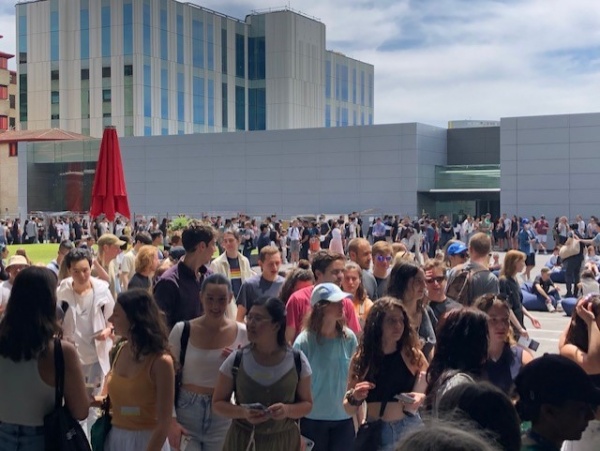
In February, hundreds of international students gathered at a University of Auckland orientation event. ENZ’s Student Experience Manager, Ross Crosson, says, “The wait, for many, has been long but there was a very positive vibe in the air.”
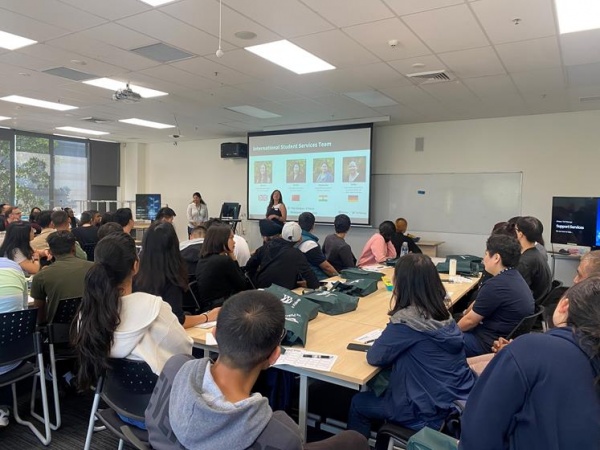
In Hamilton, the Wintec | Te Pūkenga International student services team held an interactive event to welcome students on campus. They used a range of activities to create connections amongst the students and to familiarise them with student support services available.
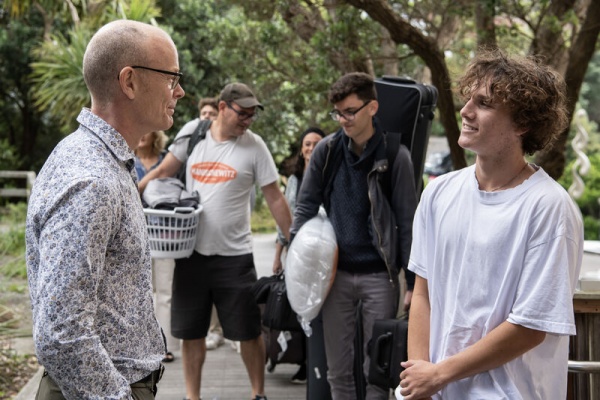
Over in Wellington, Victoria University of Wellington Vice Chancellor Nic Smith took the opportunity to connect with students face-to-face as they were settling into halls of residence.
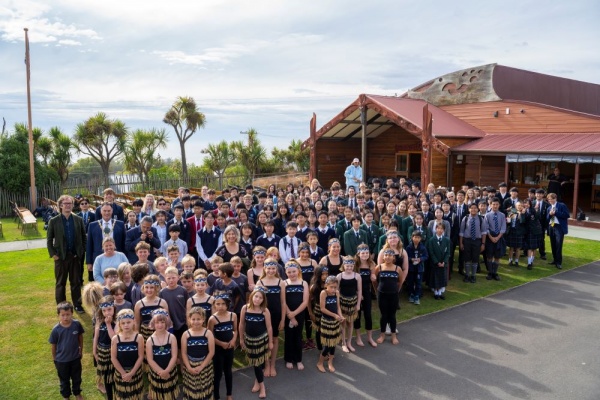
More than 150 international students from 11 local secondary schools were welcomed into Dunedin at Puketeraki Marae on 8 March. In the event organised by Enterprise Dunedin and Kāti Huirapa Rūnaka ki Puketeraki, the guests spent the morning at the pōwhiri, which was accompanied by pupils from Waitati School kapa haka group, and then enjoyed a kōrero and some kai.
-
NauMai NZ and the NauMai NZ WeChat mini programme
‘Nau mai’ is a te reo Māori phrase of invitation and welcome and NauMai NZ is the NZ government's official student experience platform, designed to support international students living and studying in Aotearoa New Zealand
NauMai NZ is written in plain English and provides practical, trusted, peer-reviewed content, designed to support and improve students’ living and study experiences. This includes information and resources to support students before arriving in Aotearoa (including useful tips on moving to New Zealand and what they need to bring), though to information to help them navigate daily life once here, including on:
- Making friends and building social connections
- Exploring and experiencing Aotearoa – the culture and the country
- Getting advice to improve wellbeing, study and living experiences
- Managing money, finding accommodation, and understanding healthcare in New Zealand
- Balancing work and study and understanding workplace culture, and much more.
You can explore more via this link.
ENZ has also developed the NauMai NZ WeChat Mini Programme. This is a companion platform to the English platform, to better support Chinese students who prefer the WeChat ecosystem. Information from the English platform is available in Chinese on the mini programme, as well as specific features that provide peer-to-peer support, such as video sharing, livestreams, forum functionality and student stories.
The following QR codes can be shared with your international students. Printed flyers are also available and so if you would like these sent to you, or have any questions for our Student Experience team, please do not hesitate to contact Faymie Li, faymie.li@enz.govt.nz, and Ross Crosson, ross.crosson@enz.govt.nz.
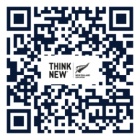
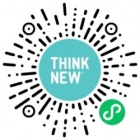
Manaakitanga is at the heart of what we all do, and ENZ aims to support you and your mahi. He waka eke noa. We are all in this together.
-
Large contingent of New Zealand education providers at China’s biggest international education events
Kicking off the series of events was the China Annual Conference and Expo for International Education (CACIE) in Beijing from 26 to 28 October. Over 4500 participants from 60 countries and regions attended CACIE 2023. This event is China’s largest annual international education conference and this year saw 16 New Zealand providers spanning all our education subsectors exhibiting at the ENZ hosted New Zealand Pavilion.
New Zealand’s representation was amongst a total of 18 national pavilions and 326 education providers from 33 countries and regions. An estimated 20,480 attended the CEE Beijing fair in person over the two days and our participation generated visibility and fostered relationships with speaking appearances, media interviews and engagement with senior Chinese stakeholders during the conference.
ENZ’s Regional Director, China, Michael Zhang said that the highlight of the government-sponsored event was having New Zealand being offered speaking slots for several keynotes, helping raise the visibility of a New Zealand education to a wide audience, especially given the level of competition from other countries at the Expo.
“The New Zealand pavilion once again secured the prime spot in the expo and during the conference, a reflection of our excellent in-market and government relationships and an important factor in helping to regain New Zealand's visibility in China’s international education sector.
“The student mobility activity in China has come roaring back this year following the pandemic. The market is huge, but competition is fierce. A few key takeaways from this major event were how student enquiries are becoming much more outcomes driven, career focused and detailed in comparison around offerings, compared to the start of the year where students had more broad questions about a New Zealand education.
“It’s also clear students in China are increasingly shopping around and applying to more study destinations before making a decision. This suggests we need to strengthen our efforts around conversion to ensure we remain competitive, and students will choose New Zealand when faced with offers from multiple destinations” added Michael.
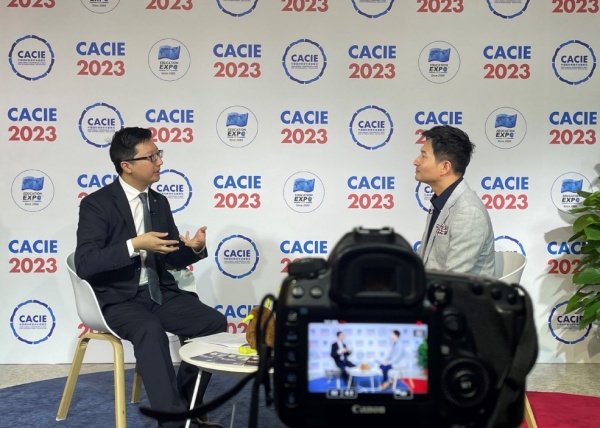
ENZ’s Regional Director, China, Michael Zhang, undertook several media interviews, including with tier one Chinese education media channels Study Abroad magazine and China Education Television. ENZ also facilitated media interviews between Chinese media and New Zealand providers at our national pavilion.
Following the China Education Expo, a series of agent seminars were held in Beijing, Shanghai and Guangzhou between 30 October and 3 November.
The Beijing Agent Seminar hosted 38 providers and 80 agents and school counsellors with more counsellors from the international departments of public schools attending than in previous years. New Zealand Ambassador to China, HE Grahame Morton, attended the event and four representatives of Immigration New Zealand’s Beijing office were also on hand to engage with agents and delivered a series of presentations. These in-market presentations attracted full houses across the Beijing, Shanghai and Guangzhou events – reflecting a strong demand for capacity building from Chinese agents. Much of the interest was focused on student visa applications and processing, decision times, and troubleshooting issues.
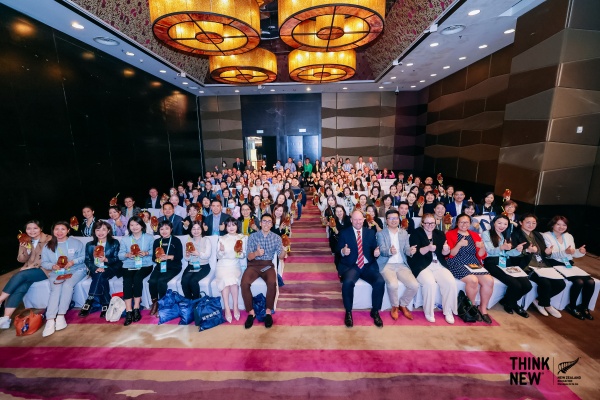
Attendees at the Beijing Agent Seminar
The Shanghai Agent Seminar saw over 100 agents meeting with the 40 New Zealand Education providers present, with New Zealand Consul-General Ardi Barnard providing opening remarks. An on-site livestream session reached 2,566 viewers across five platforms earning over 6,000 engagements. In total 28 NZ providers representing all sectors opted-in to undertake flash interview sessions during the livestream. Broadcasting by ENZ’s and partner agent online platforms, providers were able to introduce their institutions, programmes, and other features directly to prospective audiences online. Enquiries generated during the livestream are being followed up by ENZ who are directing them to the appropriate New Zealand education provider’s website or contact information and agents.
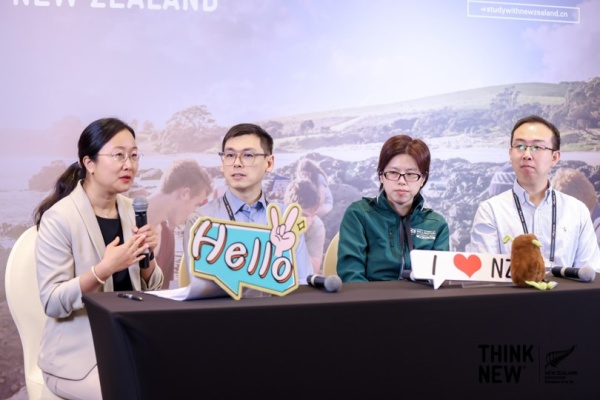
One of four livestream sessions that ENZ hosted featuring representatives from New Zealand universities, PTEs, Te Pūkenga and other tertiary institutions. ENZ gave advice to students and parents about how to choose study programmes based on the job market trends in both China and New Zealand.
Lastly, the Guangzhou Agent Seminar on 3 November saw 33 different New Zealand institutions meet with over 220 education agents and school counsellors. The seminar was supported by NZ Inc agencies and Rachel Crump, New Zealand’s Consul-General in Guangzhou, provided opening remarks for the events. A photo exhibition supported by MFAT, Connections through time, exhibited just outside the Agent Seminar space. Representatives from Tourism New Zealand and New Zealand Trade and Enterprise hosted a Study Tour photo booth at the Seminar while both agencies talked to interested agents about their New Zealand Study Tour Alliance.
In Guangzhou, eight local media outlets were invited to the event. They all spoke with sector representatives at the seminar about their programmes and enrolment requirements. As of 10 November, seven featured articles have appeared across these channels.
A big mihi/thank you again to all the New Zealand providers who helped make these events such a success.
-
PIF Recipient: Virtual Medical Coaching
In the United States alone, approximately 800 women die each year during pregnancy and within 42 days after delivery. More than 60% of those deaths are believed to be preventable. In developing countries, the rate of pregnancy-related deaths is up to 300 times higher.
An important part of the solution is education. Globally, midwives are in high demand, with the UK’s NHS increasing their places for student midwives by 3000, starting this year. Australia is also planning to increase numbers, while in New Zealand, a funding boost will increase the number of Māori and Pacific students training in midwifery.
While the demand for midwifery training is growing, education offerings haven’t kept up. Childbirth is deeply personal, and feedback from mothers – validated by hospital staff – is that they do not wish to have extra staff or students in the room for training. With no effective opportunities for face-to-face learning, there is a global need for a realistic and scalable childbirth simulation.
That’s where Virtual Medical Coaching’s vision comes in, supported as a recipient of the International Education Product Innovation Fund. Virtual reality (VR) software will provide a safe and controlled environment for students to see and assist in childbirth simulations, both with and without complications and in a range of different scenarios. As the student improves, the simulations they encounter increase in difficulty. A machine-learning algorithm enables fast and accurate feedback to both the learner and any tutors.
The simulation will be interactive and responsive, meaning that any action taken by a student creates a life-like consequence and reaction. The outcome is that learners are taught to effectively make decisions and problem solve.
Existing options for midwifery training include a physical mannequin simulator, but this can be prohibitively expensive, out of reach of many training providers, and doesn’t offer students maximum learning hours. In addition, existing options don’t include the ability to witness mechanisms like rotations/restitutions or the ability to have back and forth conversations. By contrast, the VR simulation will be available to students wherever they are, and whenever they need to practice. The nature of the VR experience means that modern learning styles, such as asynchronous and remote learning, are well catered for.
With support from the International Education Product Innovation Fund, Virtual Medical Coaching’s childbirth simulation is on track to become fully released by the end of 2024. A beta-version is already used by some educators globally. The Product Innovation Fund is a New Zealand Government-funded initiative to reimagine what a New Zealand education can look like and mean for global learners.
Managed by Education New Zealand Manapou ki te Ao (ENZ), New Zealand’s government agency for international education, the fund is supporting a range of pilot projects from existing and emerging New Zealand education providers. Together, the projects rethink how an education experience from New Zealand can be delivered, and create impact, for global learners.
For Virtual Medical Coaching, it’s about finding a better solution to a serious issue. Like many other innovative Kiwi education technology companies, Virtual Medical Coaching is designing technology that will create positive impact around the world. It’s already successfully developed an x-ray simulation for healthcare professionals which has won multiple national and international awards. Now, with the support of ENZ through the International Education Product Innovation Fund, Virtual Medical Coaching is set to respond to a clear need for better midwifery training options and develop another cutting-edge learning product for both New Zealand and offshore markets.
More information:

